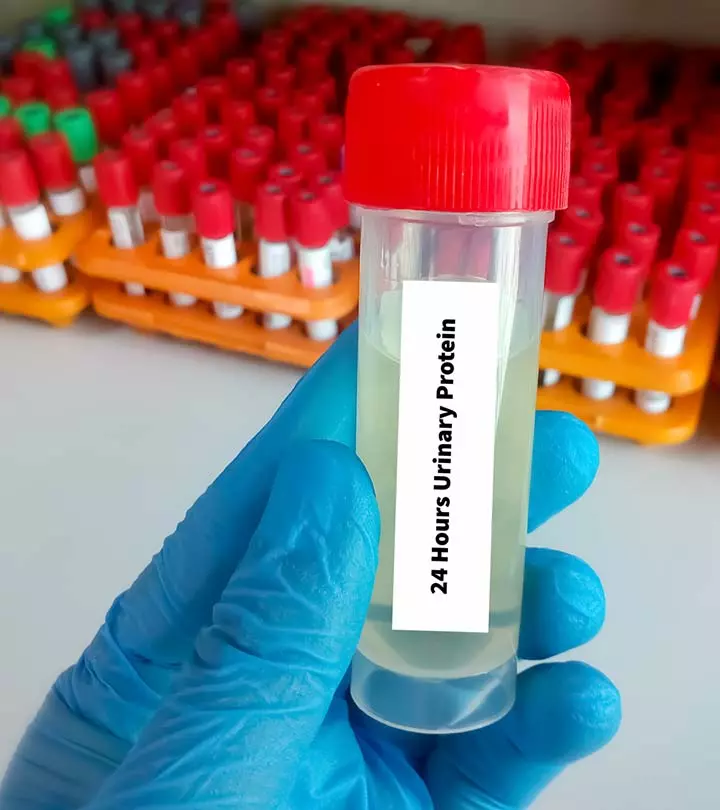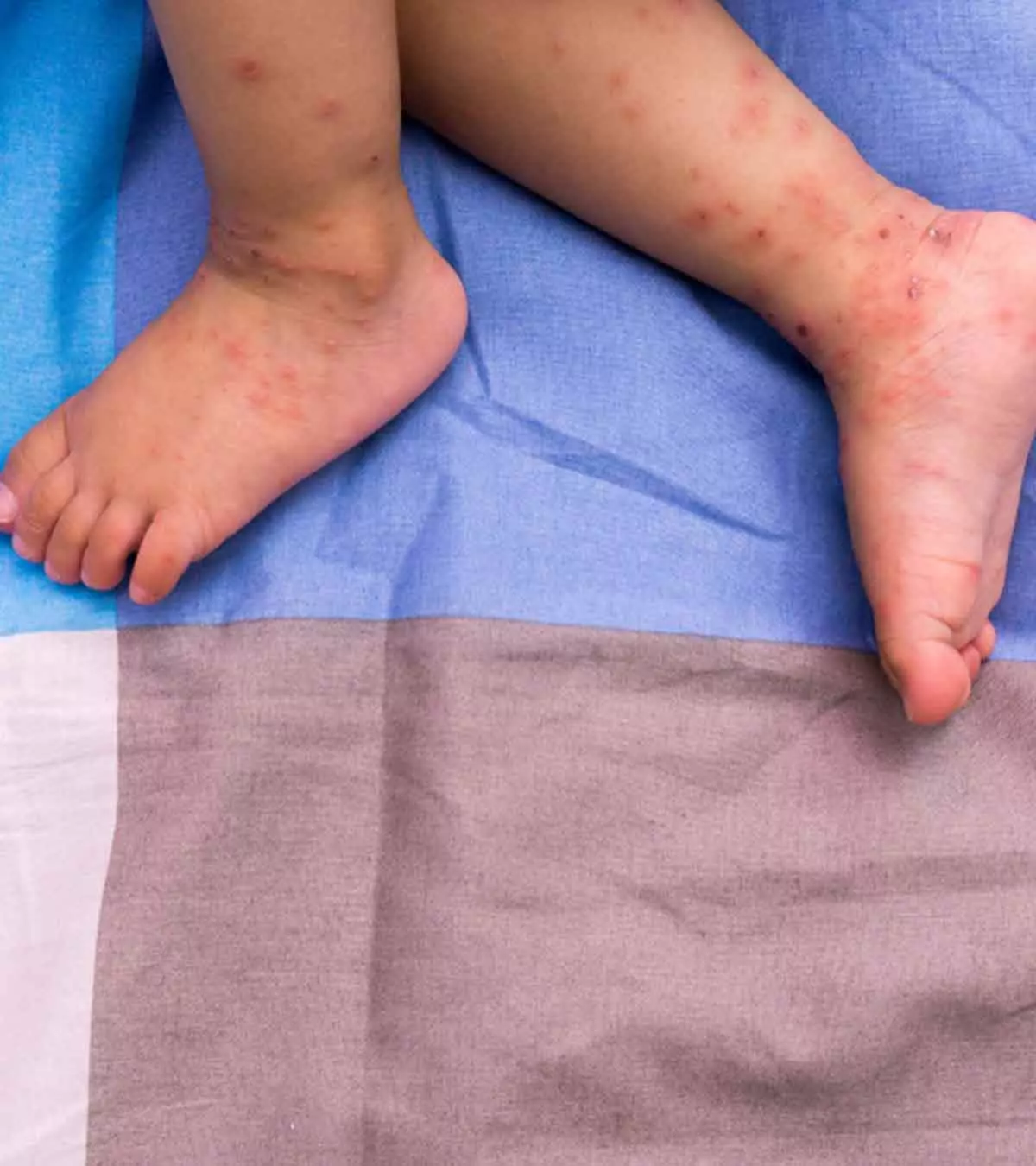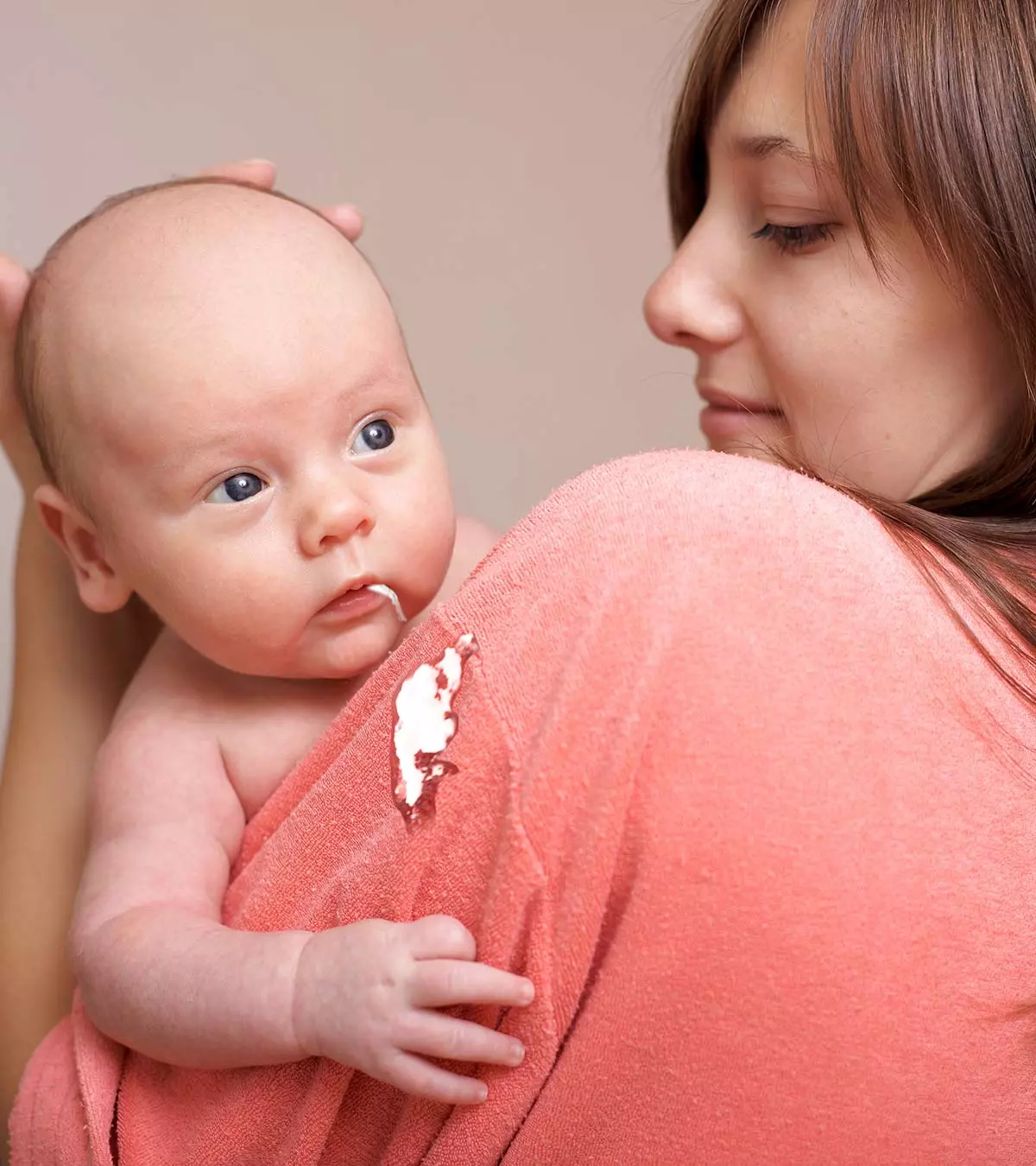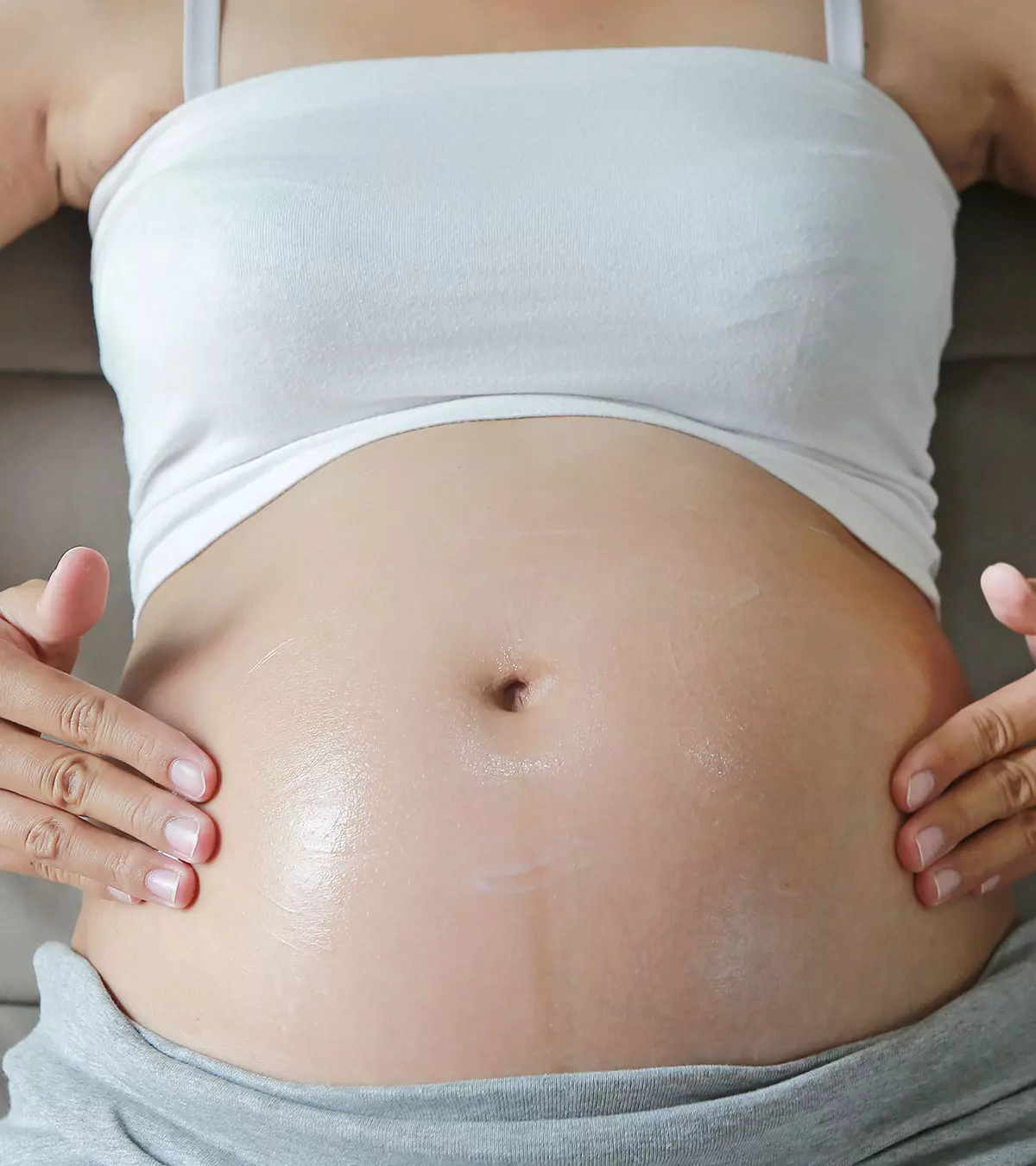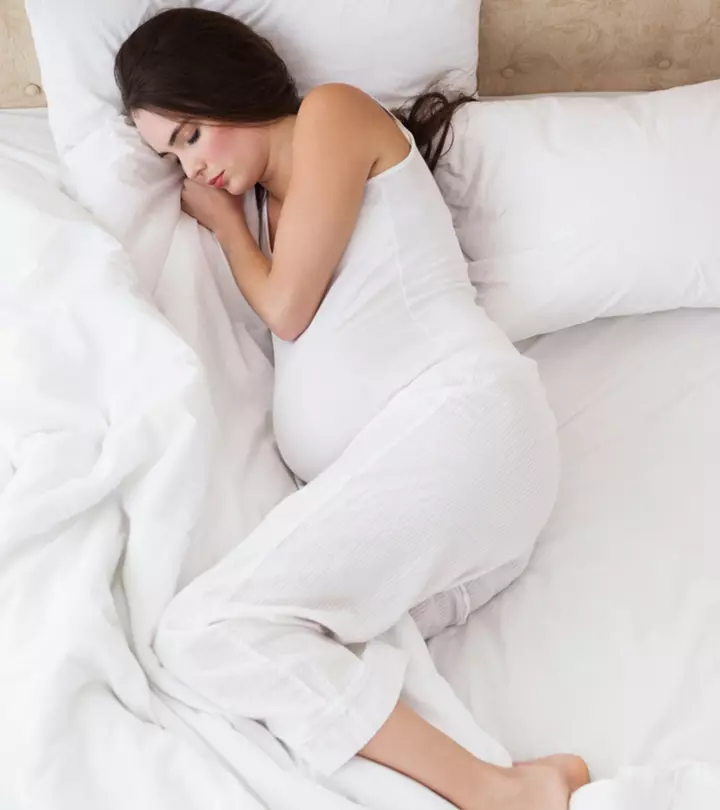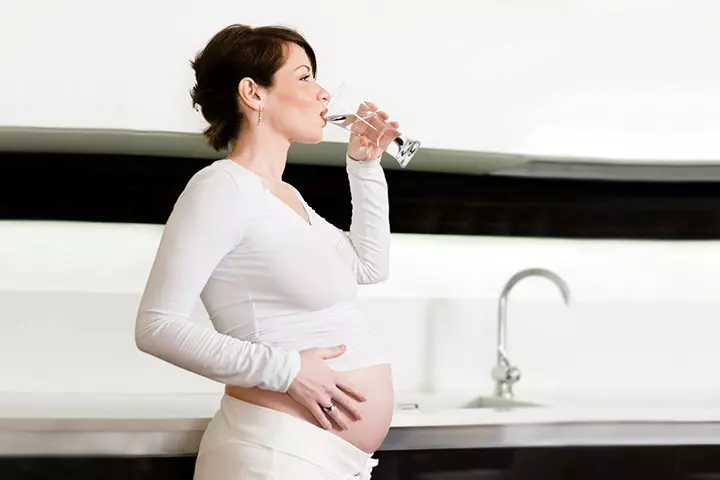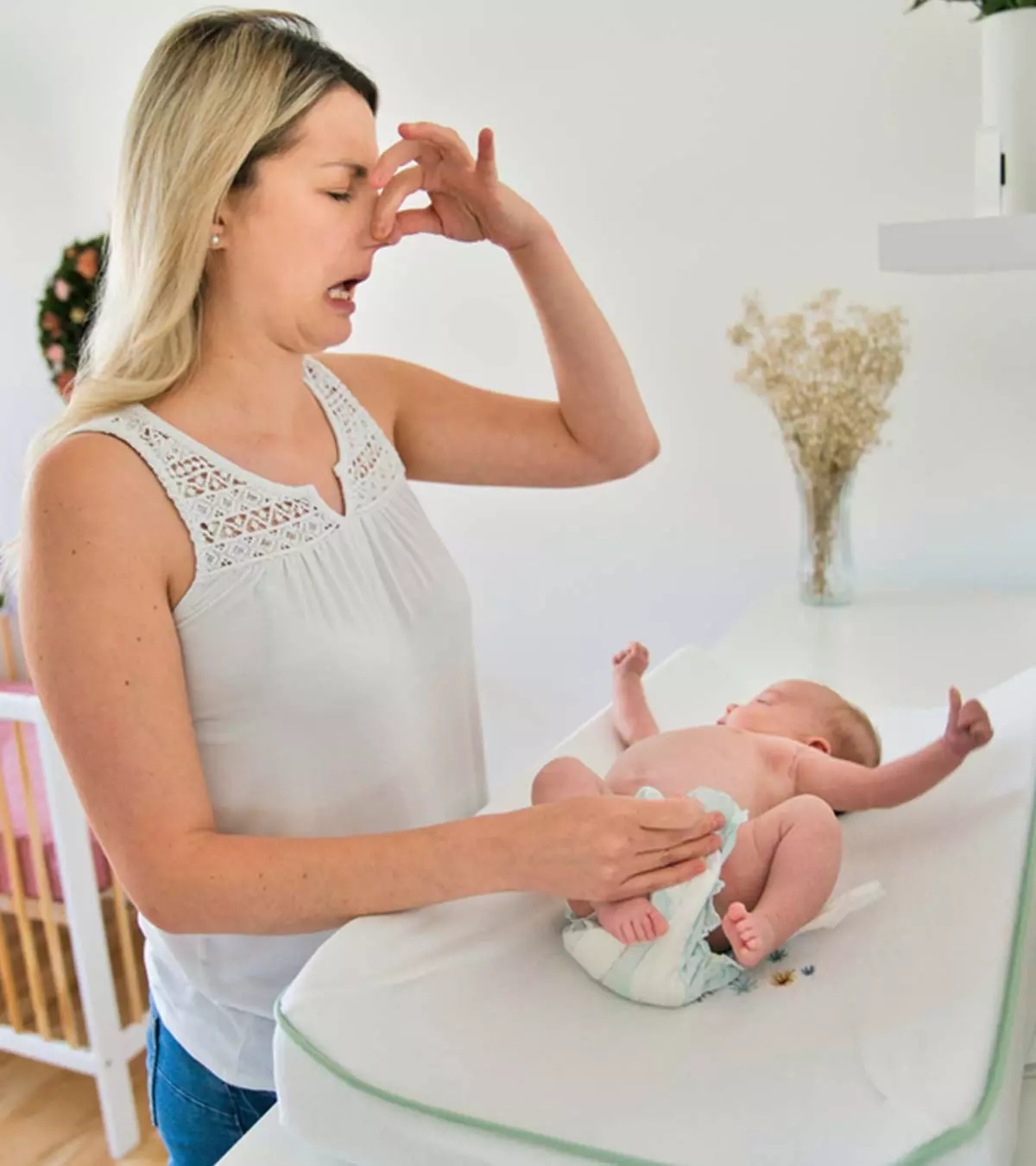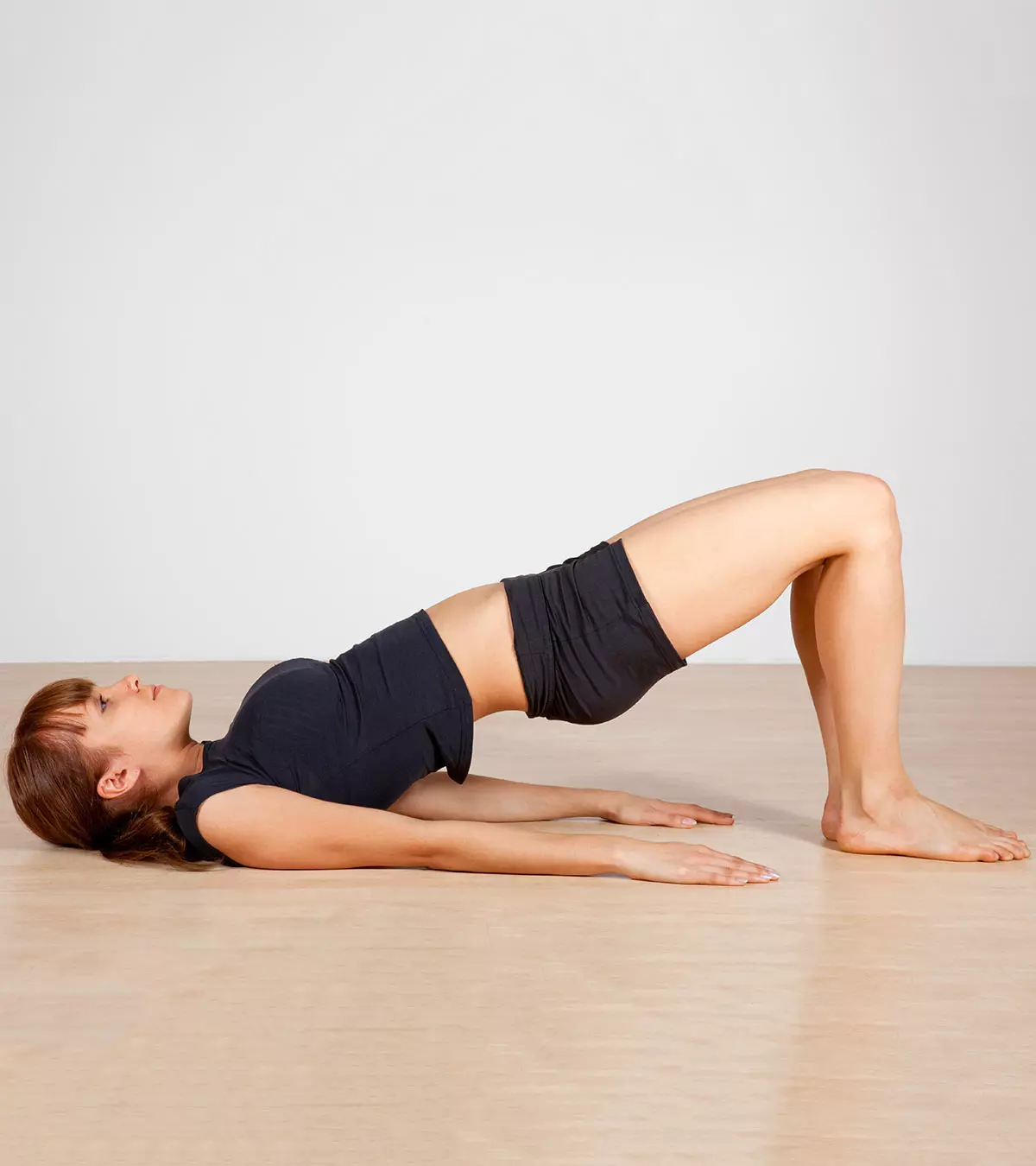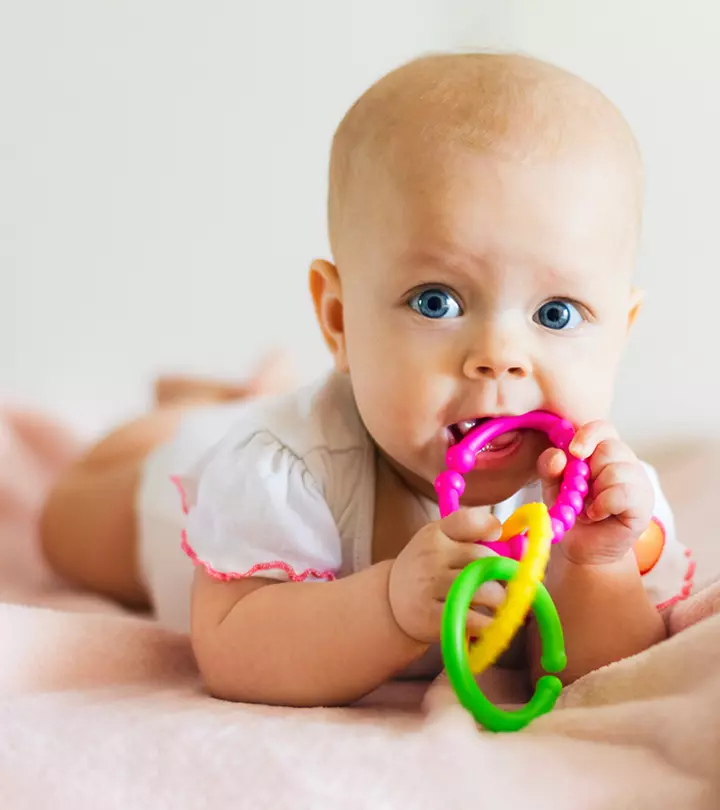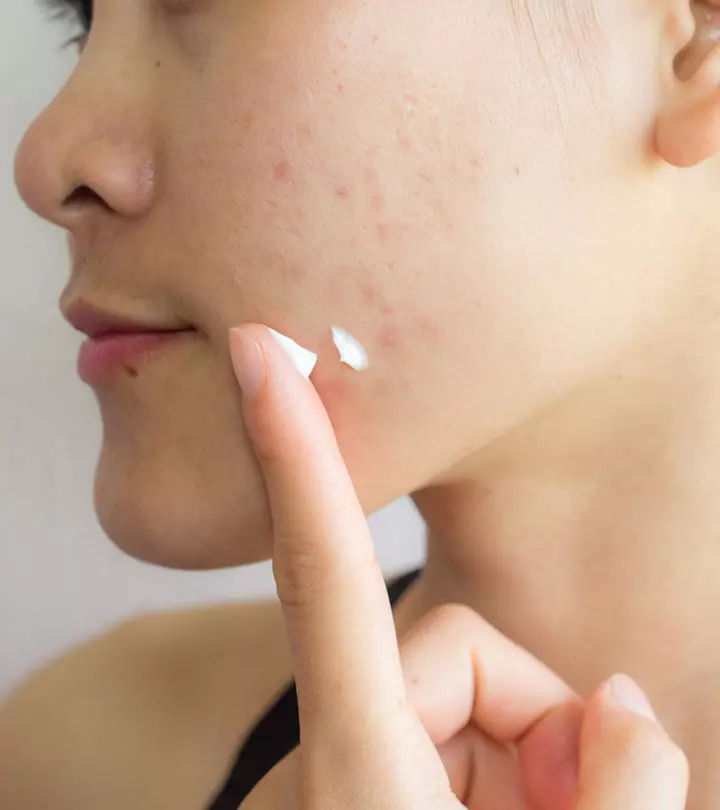
Image: iStock
Acne, also known as acne vulgaris, is a common condition that leads to whiteheads, blackheads, pimples, and oily skin. Irrespective of its severity, acne during pregnancy does not affect the growing baby. The various hormonal changes during pregnancy may make pregnant women prone to acne. It is considered that around half of pregnant women experience acne at some point during pregnancy (1). Those with pre-existing acne may experience more severe flare-ups.
The management of acne in pregnant women is the same as that in non-pregnant women. Most women may be able to manage acne at home with the help of simple home remedies and lifestyle changes (2). Read this post to learn the various causes, management, and prevention methods for acne in pregnancy.
Key Pointers
- Acne is common in pregnant women and may occur due to sebum overproduction, water retention, or increased stress.
- Apple cider vinegar, honey, cucumber, and oatmeal are a few of the ways to manage the condition after consulting your healthcare provider.
- Certain acne treatments may not be safe during pregnancy. Hence, keep reading to know about the recommended pregnancy-safe options.
Causes Of Acne During Pregnancy

Image: Shutterstock
The following are the causes of acne during pregnancy. Hormonal fluctuations are the main cause of acne during pregnancy (3).
- An increase in androgensiSteroid hormones that play an important role in initiating puberty, growing physically, and managing reproductive health. during pregnancy leads to the growth and expansion of sebum-producing cells, and therefore, the overproduction of sebum. It leads to blockage of the pores, inflammation, bacterial growth, and acne breakouts.
- Increased stress due to the physical and emotional changes of pregnancy.
- The many alterations in the immune system during pregnancy.
- Water retention is common during pregnancy, and as a result, fewer toxins are excreted from the body. These toxins get trapped in the pores and may result in acne.
- Pregnancy cravings that may lead to excessive consumption of junk food and fast-burning sugars.
Veronika, a mother of two children and a blogger, shares the changing acne pattern she experienced during her pregnancy, “The first month and a half or so of my pregnancy, my skin was pretty incredible. It was more oily, but it was also very clear. I did still struggle with blackheads, but my acne was gone. After the initial six weeks or so of pretty great skin, I did start to experience some breakouts, but they were different than the cystic acne I used to have. The acne on my back also went away which I was thrilled about — though I have gotten a few pimples on my chest randomly since being pregnant. I also noticed more recently, between about 16-18 weeks of pregnancy that my jaw and chin areas are experiencing more blackheads and pimples than before (ⅰ).’’
Home Remedies For Pregnancy Acne
Anecdotal evidence suggests the following home remedies for the management of maternal acne. However, you should consult your doctor before using them to prevent any side effects.
- Apple cider vinegar
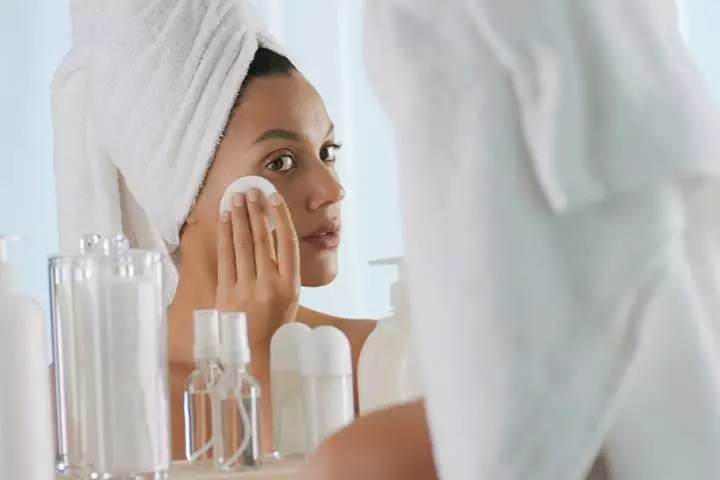
Image: Shutterstock
Diluted apple cider vinegar is applied topically to acne to absorb excess oil from the skin. You must discontinue the use of apple cider vinegar if the skin becomes dry (4).
- Baking soda
Baking soda is widely used to manage acne as it is believed to have anti-inflammatory and exfoliating properties
.
- Citrus fruits
Alpha-hydroxy acids (AHAs) such as citric acid (CA) are present in citrus fruits, including limes and lemons. The astringent and antibacterial properties of citric acid help clear clogged pores and shed dead cells. You can apply lemon or lime juice directly to the acne (5).
- Honey
The antibacterial and anti-inflammatory properties of honey can help treat acne and acne marks (6).
- Oatmeal
Oatmeal may help get rid of acne due to its anti-inflammatory and antioxidant properties (7).
- Cucumber

Image: IStock
High water content in cucumbers helps manage dry skin during pregnancy and keeps it moisturized. In addition, the astringent and antioxidant properties of cucumbers help get rid of acne and associated scars (7).
- Aloe vera gel
Aloe vera gel contains anti-inflammatory, anti-allergic, and antiseptic (inhibits fungi, bacteria and viruses) compounds that may be helpful in reducing acne. It also has moisturizing and skin-healing properties with the nourishing effects of vitamins A, C, and E that act as antioxidants (8).
- Green tea extract
Green tea extract with its antioxidant, antimicrobial, and anti-inflammatory properties, has been found to be beneficial in treating acne. Tea polyphenols may help reduce sebum production and resulting acne (9).
- Papaya face mask
Papaya extract has anti-inflammatory, antioxidant, wound-healing, and skin-healing properties (10). These benefits may be utilized to combat pregnancy acne by applying a face mask containing papaya paste.
- Essential oils
Some essential oils help prevent acne by killing bacteria or drying the skin out (11).
- Tea tree oil
- Lemon essential oil
- Rosemary oil
- Lemongrass oil
- Bergamot oil
- Sandalwood oil
- Lavender oil
- Geranium
- Hydration
Hydration will help prevent acne by flushing toxins from a woman’s body.
- Healthy food
Nutritional deficiencies may lead to maternal acne. A healthy balanced diet consisting of all essential vitamins, zinc, and other necessary minerals improves skin health and helps prevent gestational acne.
- Good sleep routine
While sleep problems during pregnancy are common, it is essential to sleep well to maintain skin health and overall health. Try to sleep for seven to eight hours a day. Sleep deprivation can cause more sebum secretion and thereby increase acne.
You may also consider establishing a regular skincare routine to manage acne during pregnancy. Talk to your doctor about safe options, including face washes, serums, and moisturizers that can be used safely during pregnancy.
 Quick tip
Quick tipIf you notice any unusual side effects, discontinue these home remedies and seek your doctor’s advice.
Treatment For Acne During Pregnancy
Adequate research has not been done to support the safety of acne medications during pregnancy. However, most doctors recommend the topical application of the following medicines during pregnancy (2).
- Azelaic acidiTopical medication with anti-inflammatory and antioxidant properties.
- Benzoyl peroxide
- Low concentration salicylic acidiTopical medication that treats skin conditions such as scaling, corns, warts, and clogged pores. preparations
- Fruit acids such as glycolic acidiAlpha-hydroxy acid derived from sugar cane that exfoliates the skin and dissolves the dead skin cells.
For severe gestational acne, the doctors may prescribe the topical application of antibiotics or oral erythromycin or clindamycin. Penicillin or cephalosporin may also be prescribed.
Light and laser therapy for acne is also safe during pregnancy (2).
 Point to consider
Point to considerUnsafe acne treatment during pregnancy

Image: Shutterstock
The following drugs are forbidden for acne treatment if you are pregnant or plan to get pregnant (2) (12).
Topical preparations containing,
- High concentrations of salicylic acid
- Retinoids such as adapalene, isotretinoin, tretinoin.
- Spironolactone (Brand name: Aldactone®)
- Tazarotene (Brand names include: Avage®, Fabior®, Tazorac®, and Zorac®)
Oral medicines including,
- Tetracyclines such as doxycycline, minocycline, lymecycline, etc., may cause brownish spots on the baby’s teeth.
- Other oral antibiotics such as fluoroquinolones or trimethoprim + sulfamethoxazole
- Isotretinoin (Brand names include: Absorica®, Amnesteem®, Claravis®, Myorisan®, Sotret®, and Zenatane®) during early or mid-pregnancy may cause miscarriage or birth deformities.
Prevention Of Acne During Pregnancy

Image: Shutterstock
The following tips may help prevent acne during pregnancy (3) (10).
- Do not wash your face frequently. Limit washing your face to twice a day with lukewarm water.
- Use a mild cleanser free of soap, oil, and alcohol to cleanse your skin twice a day as some soaps may be harsh on the skin.
- Avoid rubbing, squeezing, or picking the acne as it may leave a scar.
- If you have oily hair, wash them regularly and keep them away from the face.
- Avoid processed food, junk food, and sugar-laden foods.
- Use oil-free products for make-up during pregnancy and skincare.
- Cleanse your face and remove your makeup before you go to bed.
- Have a good sleep routine.
- Do not pick, pop, or touch the acne as it may damage the skin and spread the outbreak.
 Quick tip
Quick tip- Avoid scrubbing your face with a washcloth as it can irritate your skin or pop your acne.
- Pat your skin dry gently. Do not rub.
- Change your pillowcase regularly.
- Consider using earphones instead of using your phone against your face.
- Consume a balanced diet rich in vitamin A and zinc.
- Ensure sufficient hydration.
- Eat more fruits and vegetables as they will help regulate your bowel movements and toxin elimination.
Frequently Asked Questions
1. Is acne a sign of pregnancy?
While acne may suddenly appear early in pregnancy for some women, it does not confirm pregnancy. Maternal acne breakout may happen for several reasons apart from pregnancy (3).
2. When does pregnancy acne start?
Acne can occur at any time during pregnancy. While it is more common during the first and the second trimester, it can also happen in the third trimester (3).
3. When does acne during pregnancy go away?
There is no definite time when acne will disappear during pregnancy. For some women, acne appears in the first trimester and disappear in the second trimester. But it may again reappear in the third trimester. Acne associated with pregnancy subsides for most women after childbirth as the hormone levels return to normal (3).
4. Can acne during pregnancy determine the gender of the baby?
While there is no medical evidence to support this, according to the old wives’ tales, acne during pregnancy may hint that you are having a girl.
5. Where does pregnancy acne show up?
There is no particular body part where pregnancy acne is more frequent. It usually appears on the jawline or chin. Breakouts may also occur on your back, chest, neck, and hairline.
6. What kind of acne do I get when pregnant?
Pregnancy acne is not a separate category or type of acne. Pregnancy hormone changes cause increased sebumiOily substances that create a protective coating on the surface of the skin and help to hydrate it and save it from pathogens. production, which makes the skin more prone to acne (14).
Acne during pregnancy is not uncommon. Although not harmful, acne breakouts can make most pregnant mothers self-conscious about their appearance and raise concerns about skin health. Some may have painful acne with unusual swelling. You may consult an obstetrician-gynecologist or a dermatologist to treat acne during pregnancy. Some of the over-the-counter acne medications are not safe and may impact normal fetal development. You may rely on natural skin care remedies and prescribed medications to treat acne and other skin issues during pregnancy.
Infographic: How To Prevent Maskne In Pregnancy?
Acne due to mask use is called mask acne or maskne. Avoiding masks is not ideal during the pandemic since immunity is weaker during pregnancy. So, you may adopt a good skincare routine to prevent acne. Go through the infographic to know remedies for maskne. Illustration: Momjunction Design Team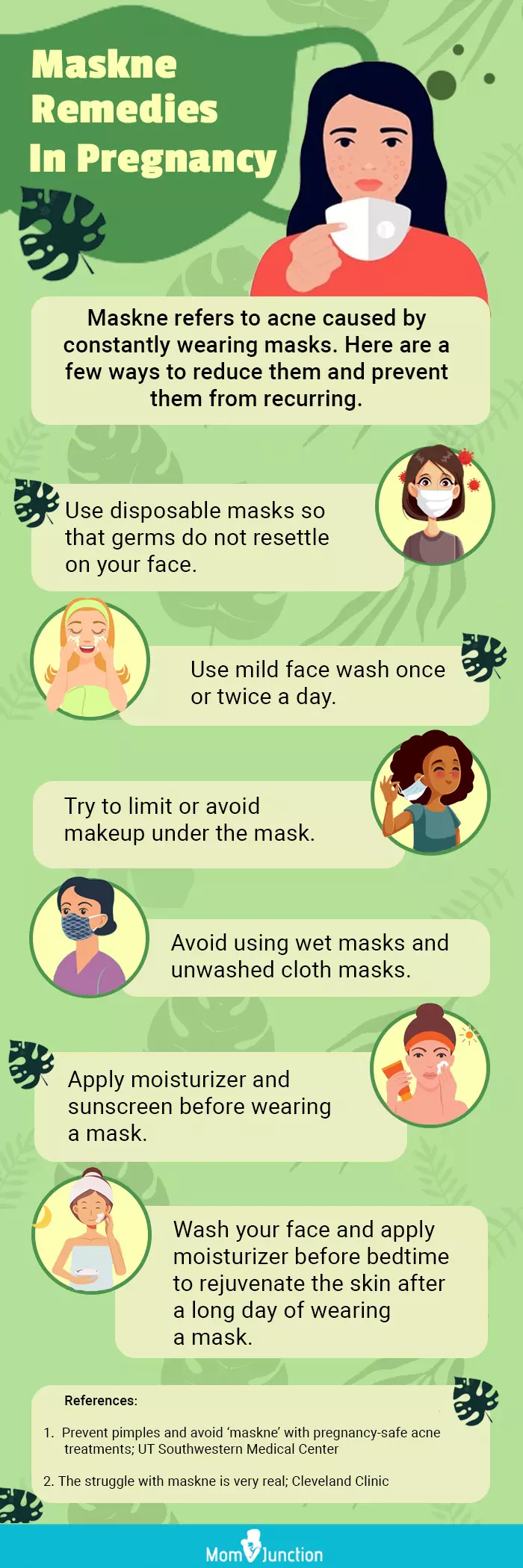
Illustration: Home Remedies For Acne During Pregnancy & Prevention Tips

Image: Dall·E/MomJunction Design Team
Learn about the common causes of acne during pregnancy and some tips to help control it given by a medical expert, in this video.
Personal Experience: Source
MomJunction articles include first-hand experiences to provide you with better insights through real-life narratives. Here are the sources of personal accounts referenced in this article.
i. Pregnancy skin care: My updated skincare routine.https://www.veronikasblushing.com/2012/12/pregnancy-skin-care-my-updated-skincare.html
References
- Skin problems during pregnancy.
https://www2.hse.ie/conditions/skin-problems-pregnancy/ - Acne in pregnancy.
https://dermnetnz.org/topics/acne-in-pregnancy - Pregnancy Acne.
https://7dmc.ae/obstetrics-and-gynecology/pregnancy-acne/ - APPLE CIDER VINEGAR AND PREGNANCY FIRST TRIMESTER.
https://health.unl.edu/apple-cider-vinegar-good-your-skin-and-hair/ - Sheau-Chung Tang and Jen-Hung Yang; Dual Effects of Alpha-Hydroxy Acids on the Skin.
https://www.ncbi.nlm.nih.gov/pmc/articles/PMC6017965/ - BENEFITS OF HONEY FOR SKIN & 10 BEST DIY HONEY FACE MASK RECIPES.
https://bespotted.org/diy-honey-face-mask/ - 10 Oatmeal Face Masks For Acne And Scars.
https://lerablog.org/health/beauty-health/10-oatmeal-face-masks-for-acne-and-scars/ - Amar Surjushe et al.; (2008); ALOE VERA: A SHORT REVIEW.
https://www.ncbi.nlm.nih.gov/pmc/articles/PMC2763764/ - THE TOP 10 ESSENTIAL OILS FOR PIMPLES.
https://www.divinearoma.org/blogs/news/the-top-10-essential-oils-for-pimples - Et al.; (2017); Green Tea and Other Tea Polyphenols: Effects on Sebum Production and Acne Vulgaris.
https://www.ncbi.nlm.nih.gov/pmc/articles/PMC5384166/ - Yew Rong Kong et al; (2021); Beneficial Role of Carica papaya Extracts and Phytochemicals on Oxidative Stress and Related Diseases: A Mini Review.
https://www.ncbi.nlm.nih.gov/pmc/articles/PMC8066973/ - IS ANY ACNE TREATMENT SAFE TO USE DURING PREGNANCY?
https://www.aad.org/public/diseases/acne/derm-treat/pregnancy - Prevent pimples and avoid ‘maskne’ with pregnancy-safe acne treatments; UT Southwestern Medical Center
https://utswmed.org/medblog/pregnancy-acne-maskne/ - Skin Changes During Pregnancy
https://americanpregnancy.org/healthy-pregnancy/pregnancy-health-wellness/skin-changes/
- Skin problems during pregnancy.
Community Experiences
Join the conversation and become a part of our nurturing community! Share your stories, experiences, and insights to connect with fellow parents.
Read full bio of Dr. Ben Abbes Taarji Hicham
Read full bio of Dr. Ritika Shah
Read full bio of Rebecca Malachi
Read full bio of Dr. Joyani Das












